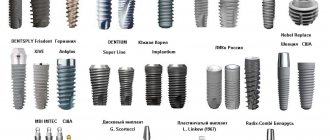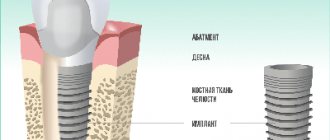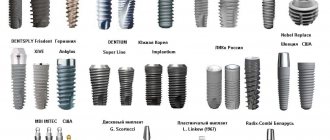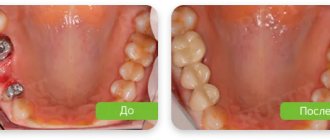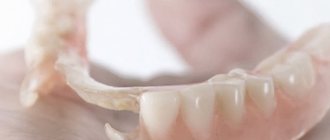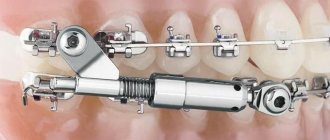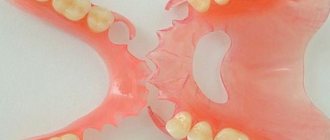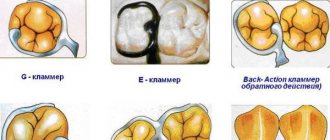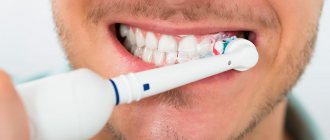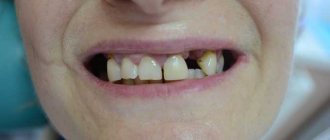From this article you will learn:
- What is an implant
- Pros and cons of implants
- Types of implants
- Installation methods
- Rehabilitation and rejection after the procedure
- Implant failure - what to do in this case
- Contraindications
- Questions and answers?
Losing a tooth relieves pain and inflammation, but gives rise to other problems. The chewing process is disrupted, and displacement of molars and premolars may begin. Therefore, it is necessary to restore the integrity of the dentition. Installing dentures and bridges is inconvenient and not always possible. Implants combine convenience, reliability, safety and guarantee a beautiful smile.
What is an implant
A dental implant (implant) is an artificial multi-component structure that is installed into bone tissue. After fusion, crowns are fixed to it. In simple terms, an implant is an artificial root that performs all the functions of a lost tooth.
A dental prosthesis is implanted into bone tissue. Then an abutment (periosteal element) and a crown are mounted on it.
Dental implant
Indications for installation are partial or complete edentia, restoration of lost incisors, molars, premolars and canines.
Pros and cons of implants
Installation of pins in bone tissue requires the experience and practical knowledge of a maxillofacial surgeon and implantologist. And fulfillment of all his prescriptions by the patient. In addition, before implantation, the oral cavity is sanitized and any inflammatory processes are stopped.
| pros | Minuses |
|
|
Table. Advantages and disadvantages of implants
Material
Dental implants are made from hypoallergenic materials:
- titanium;
- tantalum;
- zircon.
The most common material in dental implantology is titanium. According to statistics, more than 90% of manufactured implants are titanium. Titanium takes root well in the human body; it has high biocompatibility with oral tissues. Titanium's corrosion resistance is higher than that of stainless steel. It has a bactericidal effect. In modern dentistry, titanium is used in the form of alloys because in its pure form it is quite soft.
Zirconium - This metal is made from the mineral zirconium. To produce an implant, other metals are added to it. Zirconium integrates well into body tissues and does not cause allergic reactions.
Tantalum is a bioinert, durable material. It is rarely used because it is difficult to process.
Types of implants
Currently, many types of dental structures have been developed that will help solve any patient’s problem. The choice of implant is the prerogative of the doctor. And it depends on the diagnosis and individual characteristics of the patient.
By purpose
There are 2 groups of dental structures – intraosseous and extraosseous. The first ones are made of titanium alloys. They reproduce the shape of the tooth and are made with or without threads. Their surface is specially treated to increase the speed of osteosynthesis. Screw implants are the most common.
Screw implants
Extraosseous structures are indicated when it is impossible to use intraosseous titanium pins.
Types of dental implants:
- subperiosteal - indicated for insufficient bone tissue. Allows you to avoid sinus lift surgery. Installed in the periosteum, between the bone structures and the gum;
Subperiosteal implants
- stabilizing – help preserve the tooth root, making it longer. They are classified as temporary structures and are currently practically not used;
Stabilization implants
- intramucosal - installed in the mucous membranes, bone tissue is not affected. Used to attach removable dentures.
Intramucosal implants
According to the type of fixation in the bone
Based on the method of fixation in tissues, root, basal and zygomatic dental structures are distinguished.
Root - the most popular, are a threaded cylinder. Can be installed if there is a lack of bone tissue.
Basal - began to be used relatively recently. They are installed in deeper bone structures (basal bone). Their installation does not require sinus lift surgery; they are suitable for one-stage implantation and better distribute the load during chewing.
Zygomatic pins – used in cases where other methods and types of dental implants are contraindicated. They are mounted in the zygomatic bone, which makes it possible to restore the upper dentition in case of complete atrophy of bone tissue.
By design
There are one-piece, two-piece and mini-implants. The former are used for express methods of restoring a lost molar, incisor or canine. In them, the abutment is already fixed to the intraosseous part of the device. When installed above the gum, the top of the one-piece implant remains. You can immediately install a crown on it.
Two-piece ones consist of a titanium pin itself, which is immersed in the bone. Several months should pass after its installation. This implant has a recess onto which the abutment is attached. This allows, if necessary, to replace the upper part of the structure without removing the pin. This is the most popular type of implant.
One-piece and two-piece implants
The smallest dental structures are mini-implants. Their sizes range from 1.8 to 2.4 mm. The installation is painless and takes root within a month. The crown or prosthesis is installed 3 days after implantation. They are used, as a rule, for attaching removable dentures.
Mini implants
By class and manufacturer
Today, there are 3 classes of titanium pins on the dental construction market - economy, medium and premium segment.
Premium class implants are distinguished by higher quality materials and have greater capabilities. They are recommended for use in difficult cases. They are easier for the dentist to work with. In addition, the manufacturer offers many additional elements, crowns, and abutments.
Well-known manufacturers of titanium structures in dentistry:
- Straumann and Nobel Biocare (Switzerland);
Straumann implants
- Denstply – products under the TM Ankylos, Xive Friadent (Germany), Astra Tech (Switzerland);
- MIS, AlphaBio, Ards (Israel);
MIS implants
- MegaGen
MegaGen implants
Economy and mid-range segments are no worse in quality. And you need to understand that when implanting, the main thing is the knowledge and skills of the dentist.
Benefits of dental implantation
The main advantage of dental implantation: the adjacent tooth is not ground down (prepared), the treatment is local, only in the area of the missing tooth. Also important for patients:
- An implant in the bone prevents its resorption (bone without functional load quickly atrophies).
- Artificial teeth on an implant are practically no different from your own.
- Implantation can sometimes be performed immediately after tooth extraction. This is a one-step technique.
- Implants replace missing teeth of any length.
- Implants serve as the basis for a fixed (or removable) prosthesis. Instead of 3 missing teeth, you can install 2 implants, and the middle part with a narrower chewing surface to redistribute the load - a bridge.
- In some cases, replacing a tooth with a dental implant allows you to replace a removable denture with a fixed one.
- This is the best fulcrum for a removable denture, fixation improves, and the functional value of the denture increases by 20-25%.
Important: a dental implant in the bone, unlike a tooth, is installed rigidly in the bone and has no degree of mobility. Therefore, they try not to make an “implant-bridge-tooth” design.
Dental implantation allows you to restore several teeth at once
Life time
Manufacturers provide an almost lifetime warranty on dental structures. For example, Alpha Bio is 30 years old, but if a pin fails within 5 years after installation, it will be replaced free of charge. And Astra Tech, MIS, Nobel, Straumann, Osstem and Biohorizons, Ankylos will replace them regardless of the service life of the device.
Crowns that are installed on an artificial root are designed to last 10–15 years.
Factors affecting the service life of the device:
- professionalism of doctors who are involved in the implantation process;
- quality of titanium pins;
- condition of teeth, bone structures, general medical history of the patient;
- quality of oral care after installation of a dental structure.
Important! A mandatory condition for providing a guarantee is an annual dental examination.
Installation methods
The classic method of implantation is surgery, followed by a long period of osteosynthesis. Modern techniques make this process easier and faster.
Types of dental implantation:
- Traditional – carried out in 2 stages. The crown is installed six months after implantation.
- One-stage – the crown is installed immediately after implantation.
- Basal – pins are installed in the basal bone; sinus lift surgery is not required.
- Translingual - the artificial root is inserted through small punctures. The technique is considered minimally invasive. The crown is fixed after 3–4 days.
The method of installing dental structures is chosen by the doctor. It depends on the patient’s diagnosis and associated factors.
Which dental implantation method to choose?
The method, implant and type of prosthesis are selected individually after an examination; it is not chosen by the patient (although his wishes are listened to), but by a collegial surgeon, orthodontist and dental technician. Therefore, you need to contact specialists with many years of experience.
They take into account indications and contraindications for dental implantation based on X-ray and other studies, and simulate the implantation process using dental computer programs. However, they usually offer several options (crown - metal ceramics or zirconium dioxide, type of prosthesis, etc.), since the price of dental services depends on the materials used.
Rehabilitation and rejection after the procedure
Installation of a titanium pin does not require hospitalization and is performed under local anesthesia. After the procedure, the patient goes home. Survival rate and the absence of complications depend on the quality of oral care and compliance with the dentist’s prescriptions.
Recommendations for nutrition for 3 days after surgery:
- do not eat for 3 hours after the procedure;
- the first day - soft, warm, non-acidic and non-spicy food;
- chewing load - only on the healthy side;
- Alcohol and smoking are prohibited;
- It is advisable to exclude coffee and tea; the best option is herbal tea, unsweetened compote;
- observe the drinking regime.
Attention! Alcohol after implantation is completely and categorically prohibited. It promotes the destruction of bone tissue and slows down the healing process. In addition, the doctor will prescribe antibiotics. Alcohol intake is dangerous for the patient's life.
Hygiene rules:
- there is no place for hands in the mouth;
- 3–4 days – only oral baths with prescribed medications, rinsing is strictly prohibited;
- 3–5 days after examination by a doctor, you are allowed to use a toothbrush;
- 2 weeks after implantation, start using an irrigator.
After surgery, buy a new toothbrush. This way you will reduce the risk of wound infection by pathogenic flora.
After implantation it is strictly prohibited:
- using electric toothbrushes;
- brushing teeth with floss;
- carry out hygienic cleaning without a doctor’s referral - the dentist must know and be able to work with implants. Therefore, only as prescribed by the implantologist;
- chew nuts, pencils, bite any hard objects.
Smokers should give up cigarettes at least until the stitches are removed. Then after each smoking session you need to do a mouth bath with chlorhexidine.
Implant failure - what to do in this case
Rejection is an inflammatory process that is accompanied by the destruction of bone tissue. Causes pain, swelling of the gums, bleeding, and purulent exudate.
Types of rejection:
- early – begins immediately after surgery – the main reason is a violation of implantation protocols;
- medium-term – 1.5–2 years after installation of the pins. The reasons are various – from hormonal imbalance to increased chewing load on the implant;
- later – after 2.5–3 years – the main reason is violation of hygiene rules.
Rejection is an extremely rare complication after the installation of a dental structure. If any alarming symptoms appear, you should contact a medical facility.
Contraindications
All contraindications are divided into absolute and relative. It is strictly prohibited to install titanium pins in the following cases:
- blood diseases – the risk of bleeding and implant rejection increases;
- active cancer, during chemotherapy and radiotherapy – the risk of metastasis increases;
- diabetes mellitus in the stage of decompensation;
- taking cytostatics, any immunodeficiency states;
- intolerance to local and general anesthetics.
Previously, the list of contraindications to dental implantation was wider. But modern technologies and improved surgical techniques have expanded the capabilities of both patients and doctors.
Relative contraindications:
- pregnancy and lactation - any operation causes stress. Therefore, it is better to postpone the procedure until the end of breastfeeding;
- malocclusion - first correction, then installation of pins;
- inflammatory processes in the mouth, nasopharynx;
- exacerbation of any chronic disease.
In addition, it is forbidden to install implants before the age of 18, since the bone tissue is still forming. Old age is not a contraindication for dental implantation.
Questions and answers
Is it painful to have implants installed?
Implantation is a full-fledged operation. It is performed under local anesthesia or general sedation. The choice of drug and method of administration is the prerogative of the doctor. After the operation, the dentist will prescribe adequate pain relief.
Is there a difference in installation between the upper and lower jaw?
Yes, the roots of the teeth of the upper jaw abut or enter the upper maxillary sinus. Before implantation, an operation is required to lift the bottom of the sinus and build up bone tissue. In addition, in some cases, zygomatic implants are used. Bone augmentation to install a pin in the lower jaw may not be performed. This depends on the results of the patient's examination.
At what age are implants placed?
From 18 years and older. Old age is not a reason for refusing to install a dental structure. The procedure is allowed at both 70 and 80 years of age.
Is it possible to do an MRI after implantation?
Dental implantation is not a contraindication for either MRI or CT. The dental structure is made of titanium alloy. During the procedure, it will not heat up, will not move, and will not cause pain.
Indications for dental implantation
Dental implants are installed when the formation of the skeleton is complete and bone growth has stopped. The upper age limit is individual. In orthodontics, there are cases where implantation was carried out for people 70-85 years old. If the patient is relatively healthy, the implant can be installed.
Implantation is indicated if:
- one tooth is missing, and next to it all are healthy (intact) or with limited defects;
- 3 or more teeth are missing in a row, up to complete absence;
- there is an allergic reaction to plastic;
- the patient has illnesses or psychological reasons due to which he cannot wear a removable denture.
Free dental consultation
Our clinic offers a free examination by a dentist or implantologist. The doctor will examine the oral cavity and give recommendations for treatment and dental prosthetics.
You can read all the nuances of implantation in the article.
To find out more about prices for treatment and installation of implants, go to the appropriate section of our website. Registration for a consultation is carried out by phone and 7(920)-090-49-94, in the feedback form and during a personal visit to the clinic.
You can also find more information about installing implants in the article.
FULL CONSTRUCTION
Cost of implantation of 1 tooth on a turnkey basis:
cost of installing an implant, plug, gum former, work of an implant surgeon, installation of an abutment, work of an orthopedist, impression of the jaw, laboratory services and work of a technician, cost of a metal-ceramic crown*
* cost of zirconium crown
*The cost of dental prosthetics is indicated for the installation of a metal-ceramic crown. When prosthetics on implants with a zirconium crown, the cost increases by 10,000 rubles
* the promotional price for the installation of dental implants is valid for two implants or more
| Implantation system | Implant installation | Installation of the driver | Prosthetics* | TOTAL |
| 20 000 | 3 000 | 20 000 | 43 000 | |
| 20 000 | 3 000 | 20 000 | 43 000 | |
| 40,000 per promotion 35 000 | 5 000 | 40 000 | 85,000 per promotion 80 000 | |
| 40,000 per promotion 35 000 | 5 000 | 40 000 | 85,000 per promotion 80 000 | |
| 40 000 | 7 500 | 40 000 | 87 500 | |
| 40 000 | 5 000 | 40 000 | 85 000 | |
| 40 000 | 5 000 | 40 000 | 85 000 | |
| 25 000 | 5 000 | 25 000 | 55 000 | |
| 20 000 | 3 000 | 20 000 | 43 000 | |
| 20 000 | Installation of the mating part in a complete removable denture 3 000 – 5 000 | |||
Our doctors will select the best solution to the problem of missing one or more teeth, help you understand complex issues and draw up a plan for successful dental treatment.
